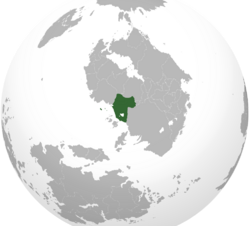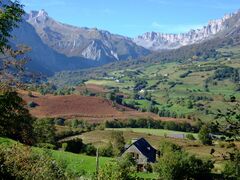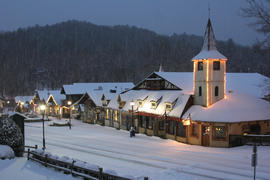Calinthia
This article is considered abandoned lore either because its creator has changed projects or has left the community. Accordingly, it is not only non-canon but it is also eligible for salvage pending approval from an administrator.
|
Calinthia/Kalintia ("Kalinthisches Reich") 'Kalinthisches Reich'(Calintian) | |
|---|---|
|
Flag | |
Motto: 'Menschen vor Profit' ("People Before Profit") | |
Anthem: Lieber Tot Als Entehrt ("Better Dead Than Dishonoured") | |
 Location of Calinthia (dark green) In Levantia (gray) | |
| Capital and largest city | Aurelia |
| Official languages | Calintian Other Romance Languages |
| Religion | Secular State (De Jure) Catholic (De Facto) |
| Demonym(s) | Calinthian (noun) Calin (adjective) |
| Government | Unitary one-party fascist state under a totalitarian dictatorship |
• Chancellor | Syrilla Constatine II |
• Vice-Chancellor | Rudolph Egerts |
• General of the Military | Felrich Franz Sarino |
| Legislature | Reichstag |
| Reichsrat | |
| People's House | |
| Establishment | |
• Decree of King Joraine I | 1593 AD |
| Population | |
• Estimate | 81,000,000 (2025) |
• Census | 79,138,011 (2020) |
| GDP (nominal) | estimate |
• Total | $2.1 Trillion |
• Per capita | $30 700.496 (2020) |
| Currency | Kalintian Mark (KTM) |
| Driving side | right |
Calinthia, officially the Calinthian Empire (Gothic: Kalinthisches Reich), is a country in Levantia. It is neighbored by Yonderre, Urcea, Avonia, Eldmora, and Ardmore. It is the region located within the South-Western portion of the continent of Levantia. It was founded in 1593 AD by King Joraine I. Originally the territory was known as the Western Levantine Kingdom founded in 917 AD, and was a part of the Holy Levantine Empire. In modern times Calinthia is known simply as Kalintia and is headed by the current Chancellor Syrilla Constatine II since 1999.
Etymology
The Empire of Calinthia is the non-Kalintian form of Kalinthisches Reich. Kalintia is the name of the ancient Gothic Goddess responsible for the Goth people that inhabit her land and their well-being. The people who live in her land are known as "Kalintian" or Calinthian. Kalintian has been the official language of Kalintia since 1961 when Chancellor Decia enacted the "Order 1638" which de-Latinized the country. Modern historians now refer to it as the Gothification of Kalintia. Kalintian is a hybrid language of Gothic-Latin mix. Mostly Gothic, many Latin speakers have trouble understanding modern Kalintian.
History
Early History
During the time period of Great Levantia, young King Galaecius I (Born 441 AD) at only 16 years of age was tasked with expanding the Empire Westwards across the riverlands. He spent the next 45 years battling against Gothic and Gaelic tribes who lived in the regions. King Galaecius I was able to expand the Empire's borders well past what was expected of him, going all the way to what was then the Western border of Gothica. By 481 AD both the regions of Gothica, and Carna fell under King Galaecius I domain. The Levantian Emperor granted King Galaecius I the title of Gothicus for his conquests, and allow him to rule over the new land as King Galaecius I of Calintia. However, King Gothicus Galaecius I and his armies faced a new threat. Due to their conquest in Grussland and Carna, Gothic barbarians from modern day Yonderre having heard of King Galaecius I began descending on the new found Kingdom of Calintia. Northern raids soon turned into a full fledged invasion, and by 492 AD, most of the Northern region of Calinthia including the modern Shimmering Forests were filled with Gothic war camps. Turning his attention North, King Galaecius I fought the Goths back to the Arathian Pass in what would be known as "The Arathian War (492-493 AD)". The Arathian War was notable for battles taking place in the Shimmering Forest as well as across the Montes Aureos mountain range. The most famous battle was that of the Battle of Arathian Pass in 493 AD. The battle saw King Galaecius I outnumbered 43 to 1 by his Gothic counterpart Will of Wandsberg who was King of the Goths in that region. Despite heavy casualties, King Galaecius I eeked out a pyrrhic victory and managed to kick the Goths out temporarily. King Galaecius I was then granted the title of Restitutor Orbis, or "Restorer of the World". 8 years later, Will of Wandsberg and his son would return to Calintia, and in a series of battles forced King Galaecius I back into the Riverlands. Gothic hordes joined forces with local Gaelic tribes and marched on the Empire's heartland. In 502 AD, Great Levantia collapsed shortly after the barbarian invasions.
The Empire of Calintia was established in 502 AD follwing the collapse of Great Levantia. Overwhelmed by barbarians both Gothic and Gaelic, Emperor Gothicus Galaecius I now age 61 created his Empire to combat the barbaric hordes alone. Emperor Galaecius I managed to retake most of Western Calintia in a series of battles that was known as "The Palantius War", Palantius being the ancient Calintian word for rivers. As the name suggests, the wars took place in the Western Calintian riverlands. The war resulted in many Gaelic and Goth barbarians dead, and a good portion of the land taken in the earlier conquests retaken (although most of the Western lands would remain permanently in Gothic hands).
Republican Period
During the mid to late 1800s, cultural and material trade increased dramatically over the century. This was a result of the Coronation of Queen Syrilla Constatine I following her father's death in 1804 which saw relations between Calinthia and Yonderre flourish. Both Yonderre and Calinthia experienced economic and cultural flourishment in what was known as "The Second Calinthian Golden Age". Ideas around philosophy and politics would spread rapidly. Despite being a woman in a male-dominated space, Queen Syrilla was hailed as "Regina per l'eternità" literally "Queen for Eternity". However, despite being a peaceful rule, Protestant extremist activities during this period increased. While a small minority, Protestants within Calinthia grew more active despite the persecution over the centuries. They began to protest and make their voice heard within public spaces. Due to the cultural changes during this time, many Catholic Calinthians believed their fellow countrymen deserved rights such as being allowed to worship freely. Many Protestant Calinthians and even Ænglish-Calinthians were allowed to hold public office and work in Calinthia. Over the century, support for the Royal Family declined, and support for a Republic grew. Queen Syrilla hearing the people's protest formalized a Constitution in 1856. The Constitution guarenteed the right to worship Christ in either Catholic or Protestant sects. It also saw the first government backed creation of Protestant Churches across Calinthia. Many hard-line Catholics protested and even rioted in the streets of the capital Aurelia, but the majority of voices were with the Protestants. Ænglo-phobia was reduced, and made illegal until 1924. Queen Syrilla would pass of old age in 1861. Her son, Randolph Constatine I would not become king as the Kingdom of Calinthia became the Republic of Calinthia in 1861, thus ending a 300 year long Constatine rule. Randolph I was rumored to be born out of wed-lock in an incestuous affair between Queen Syrilla and her Cousin Lord Rupert Constatine I, but many Monarchists deny these claims as Protestant propaganda.
After the first Great War (in which Randolph I would fight in), the Republic of Calinthia was in disarray. Over 800,000 Calinthian men had died in the war. This was out of a population of 16 million at the time of 1896. By 1903, many Calinthians began questioning the strength of the Republic and how it could so easily throw their young son's lives away. Randolph I, despite now living in Urceopolis, found himself being supported as King by a portion of the far-right Catholic political groups in the Republic. Many had desired to return to the glorious Monarchist past that had led them through so much already. Many Catholics began questioning the motives of those in charge such as Prime Minister Langford Goodwin, an ethnically Ænglish Protestant of the Protestant Left-wing party 'Anglosphere'. Ænglo-phobia was at an all time high, as a conspiracy theory known as "The Great Betrayal" was floated around political groups. A majority of the country believed that the Ænglish political arm of the Calinthian Republic purposefully caused the deaths of mostly Catholic Calinthians as to reduce Catholic support in the Republic's Senate. In 1938, after 2 decades of turmoil, protests, and riots leaving hundreds killed at the hands of police; the Republic was officially overthrown in an event known as the First Calinthian Civil War. Randolph's son, King Randolph II was crowned as king and the Kingdom of Calinthia was reborn.
Cold War Period
The Cold War period in Calinthia was tumultuous for the region. The region of Calinthia would be split in half. Western Calinthia which is predominantly Gothic formed the People's Republic of Calinthia (PRC), a one-party totalitarian dictatorship. The Eastern regions which are predominantly Latin formed the Kingdom of Calinthia. Both nations were at odds with one another and multiple minor wars were fought in Calinthia during the length of the Cold War. Most notable was the War of Eracksmarc, also known in Calinthia as the Homeland War in 1958 in which the PRC under leadership of Premier Fredrick Broncroft would launch an invasion of the Kingdom of Calinthia and take multiple Northern regions cutting off the Kingdom of Calinthia from their neighbor Yonderre. The Kingdom of Calinthia would launch a surprise counter-attack across the line of contact that resulted in a large pullback from the PRC across the River Uern. Here the PRC would build defensive lines over the course of two months with hedgehogs, minefields, anti-tank ditches, and even some concrete bunker emplacements. Two months after the beginning of the war the Kingdom of Calinthia would launch an offensive over the River Uern and despite suffering heavy casualties would push towards Yonderre, securing their trade routes. Unfortunately, King Randolph Constatine III would die from artillery fire near the frontline after meeting with his generals in the pre-lude to the offensive. The war would ultimately end in a stalemate with both sides agreeing to the new border.
After the death of the King, his daughter Princess Decia would be coronated shortly after the offensive. Now Queen, she found herself with a broken Kingdom, economic sanctions, a shaken military, and people questioning the war. Queen Decia while princess was a radical and fervent supporter of the Die Volkszukunftspartei, the National Socialist party of Calinthia. In 1958, in co-ordination with far-right political groups such as Die Volkszukunftsparte and Partito del Movimento Nazionalista, Queen Decia formed a coalition of national socialists. This angered many of the minority Republican voices within the government who had hoped for a future Constitutional Monarchy like so many other modern nations had achieved. In 1959, Queen Decia would formalize a coalition between the Nationalist parties Die Volkszukunftsparte and Partito del Movimento Nazionalista which represented a union of the Gothic and Latin people of Calinthia into one distinct ethno-nation. On September 20th, 1960, Queen Decia would announce her decision to dissolve the current monarchical government, end the fiefdom of the people to the Monarch and establish the Führungsmoral (Leader's Ethics). After which, Queen Decia would abdicate the throne and instead become Chancellor Decia of Kalintia.This event is known as the Gothification of Calinthia. The official language changed from Latin to Kalintian a Gothic-Latin mix.
In 1961, the PRC would be invaded by the Kalinthisches Reich under Führerin Decia . The invasion would begin on Chancellor Decia's birthday of September 20th. Calinthian panzer-divisions would storm across the Engel River with pontoon bridges. PRC forces would be taken completely by surprise. Many PRC divisions surrendered almost entirely en-mass. The most brutal fighting happened in the Battle of Wagner Platz in which the 12th North-Herstellungburg Battalion of the 1st Panzer Division (Calinthian) would encounter heavy resistance from the 47th Motor-Rifles Battalion (PRC). On September 26th, Premier Johannas Arcenschaff of the People's Republic of Calinthia (PRC) would announce that the People's Republic of Calinthia was waging a Vaterländischer Krieg (Patriotic War) against the "fascist, Imperial pigs who have whored themselves out to international bankers and financiers at the cost of the Calinthian workers". By August 6th, the PRC military had stablized the frontlines around the Oder-Bergund region West of the Engel River.
Modern History
On August 8th, 1994 at age 58, Führerin Decia would relinquish her title and pass it off to her daughter. Her daughter Syrilla Constatine II would be pronounced Führerin on September 19th, one day before Decia's 59th birthday. On her coronation while only 23 years of age, Führerin Syrilla II promised peace and unity for all Calinthians, but also justice against those who would seek to divide or destroy Calinthia. Many Calinthians supported the coronation with streamers and banners supporting the new, young Führerin. However, Avonia residents of the far North-East feared retribution and increased oppression at the hands of Führerin Syrilla II. This was mainly due to her further speeches on September 26th and 29th where Führerin Syrilla II promised to mass deport Anglish from the nation. This fear would lead to multiple terrorist attacks committed by Anglish extremist group Our Heartland Division in the month of October. The most impactful of these terror attacks was the bombing of Aurelia Platz on October 24th, 1994. On the same day as the bombing, Führerin Syrilla II would call for immediate mass deportation of all Anglish from Calinthia with the help of the military. After a series of clashes in the North-East between local police forces and the Anglish extremist organizations, the beginning of the 164 Day War, also known as the Syrillian War.
Geography
-
Solasire Dam located in North Western Calinthia
-
Castle Albicus located on the North end of Lake Romulus, in the North-West region of Calinthia. (Looking East)
-
A small village in a valley located within the Montes Aureos region.
-
Napolis, the second most populated city in Calinthia.
-
Helann-Ostberg, the birthplace of Chancellor Decia and capital city of the State of Ostberg
Climate and environment
Calinthia is a temperate region. However, the Northern mountainous region experiences colder climates than the Southern coastal region.
Government and Politics
Executive and Legislative
All Executive and Legislative decisions pass through the Parliament. Parliament members then vote on the decisions directly overseen by the President of the Parliament and First Deputy President. As there is no constitution being upheld nor separation of powers, the Parliament decides laws, rights, and other economic systems through their voting. The President of the Parliament and First Deputy President both report to the Chancellor and Vice-Chancellor directly on decisions before they are made. Both the Chancellor and Vice-Chancellor have final say in regards to decisions and may overturn the Parliaments decisions at any time.
Federal subdivisions
Politics
Calinthia is a fascist nation ruled by a totalitarian dictatorship. It is anti-Avonia, anti-Protestant and anti-Communist. It is ruled by Die Volkszukunftspartei (The People's Future Party). It puts national loyalty above individual and above profit of companies.
The former three political parties prior to 1994 were as follows: Partito Lealista Monarchico (LM), Die Volkszukunftspartei (VK), and Partito del Movimento Nazionalista (MN). All supported the royal family and the monarchy but viewed the way in which the monarchy should exist differently. The Loyalist Monarchy party (LM) supported the a Constitutional Monarchy. The Nationalist Monarchists Party (MN) supported a more traditional form of government headed by an absolute monarch. Finally, Die Volkszukunftspartei is the Fascist National Socialist party which supported Queen Decia as Führerin and is now the main political body in the country.
Law
The justice system in Calinthia revolves around the Führerin as the absolute power in the nation. However, in the absence of the Führerin's order over typically political crimes, the courts determine the punishment. Judges are extremely powerful being able to convict or release individuals due to the passing of the Justice Again Act of 1977 which gives Judges the power to convict based on established case law. However, the Act further states than any such judge which is found to be convicting en-masse without evidence or releasing repeat offenders, will be jailed. Also under the Act, repeat offenders are also given three chances before they are capable of being imprisoned indefinitely. This is only for crimes in which the charge is petty, such as theft or burglary. Crimes in which the charges are felony are first time offense only, such as murder, rape and pedophilia. Felony convictions always carry the punishment of capital punishment, almost always being execution.
Military
Calinthia has a long historical military tradition dating back to the time of Emperor Galaecius I. The first-born son of every Calinthian family is socially expected to serve for at least several years in the Calinthian Armed Forces. While not a requirement, most feel socially pressured into serving their time, while many more willingly volunteer their time. It's common for a single family to have multiple members serving in the military at any given time.
Demographics
Ethnicity
Calinthia is a homogeneous country. The main ethnic group of Calinthia is Gothic-Calinthian at 91.3%. Followed up by non-Calinthian Gothic people at 6%. Finally, there exist an Ænglish minority at 2.7%. Calinthian is described as a Latin-Gothic mix. Due to the high intermixing during the existence of the Kingdom of Calinthia, this new admixture of Latin-Gothic peoples came to be referred to simply as 'Calinthian'. Since 1963, non-Latin or non-Goth individuals are not permitted permanent residence into the country due to the passing of the Anti-Foreigner Racial Policy.
Language
Due to the Anti-Ænglei Laws of 1952, the Ænglish language is outlawed in any official capacity. Legal documents, public signs, hand-written notes, and even public speaking must be in Calinthian or Gothic. Calinthian and Gothic are the two state languages with Gothic being more prominent in the North West of the country.
Religion
Due to the Anti-Ænglei Laws of 1952, any non-Catholic religions were temporarily banned. Any religious practice outside of the Catholic or Protestant churches were illegal prior to reunification in 1962. Despite the legalization of non-Catholic religions, primarily Protestantism, Catholicism and secularism remain the most prominent beliefs in Calinthia.
Education
State-Education within Calinthia is enforced. All children age 5-16 years of age are required to attend state-funded schools. After reaching age 16, Calinthians are given state sponsored scholarships to state funded Universities. While education is open to men and woman, women are expected to begin raising a family.
Culture and Society
What do your people do, and what are they like?
Education
The education system in Calinthia is organized by regional states. However, all federal education laws passed by the Bildungsausschuss (Education Committee) are applied to each state. The federal education laws include provisions on what is allowed to be taught in schools, such as sexual education, religion or evolution. Children are also required to be part of the Kalinthische Kinderpfadfinder (Calthinian Children Scouts) from age 6 to 12. From ages 13 to 19, students are required to maintain membership in the Kalinthische Jugendliga (Calinthian Youth League). Education is free to all Calinthian citizens from age five to twenty-one, after which students may apply for a loan to attend more prestigious universities.
Attitudes and worldview
A vast majority of Calinthians are members of the Die Volkszukunftsparte. Catholicism is the main religion for Calinthians and it is represented in their world views. Sunday is a day in which most non-essential workers are at Church repenting and praying.
Kinship and family
Due to Catholicism playing a large role in the everyday lives of Calinthians, families are no different. The average Calinthian family has around 4 children per household. Having just one child is viewed almost as a cultural taboo. This is taken into consideration when building homes with most houses being built with 5 bedrooms.
Cuisine
Most of Calinthian cuisine depends on state or region. Most of the coastal regions make use of fish, shrimp and crab. Calinthian crab soup is considered one of the most famous dishes and international exports. Wine is a particularly famous export to countries like Yonderre and Urcea. Many vintners travel between Yonderre and Calinthia and even own multiple vineyards in each nation thanks to the use of dual-citizenship between the two countries.
Religion
Catholicism is extremely rooted within Calinthian culture and way of life. Whether through art, language, politics, military, or even family, the impact of Catholicism is apparent.
Arts and Literature
Classical music was extremely popular for most of Calinthia's 20th century. Famous musical pieces such as Ich wünschte ich wäre in Kalintia (I Wish I Was In Calinthia) and Sie wartet dort auf mich (She Is Waiting There For Me) by 19th century classical artist Hans Verböe were particularly popular throughout the continent.
Sports
Does your country have any major sports leagues? What types of sports are played, both professionally and for fun by your country's people?"
Symbols
The Calinthian Cross, Shadow Eagle of the Wessenbäch Mountains and the Star of St. Augustus are symbols of Calinthian spirit and national unity respectively. These symbols are worked into Fascist propaganda leaflets and posters often.
Economy and Infrastructure
How does your country's economy work?
Industries and Sectors
The automobile industry as well as the military arms industries are the two largest parts of the Calinthian economy. The military arms industries represent 3.3 percent of the overall GDP spent per year. The automobile industry accounts for 9.6% of the countries GDP annually. Yonderre and Urcea are the two largest importers of Calinthian automobiles which are renown for their reliability, ability to be mass produced and their speed.
Currency
The Kalinitan Mark (KMT) is the national currency of Calinthia. However, the state also accepts Yonderrian Taler currency at most banks, government buildings and other businesses.
Healthcare
Healthcare is Calinthia is free to all Calinthians regardless of economic class or background. It is paid for through state and federal taxes, with state tax only going to local community hospitals. State tax is also adjusted per state based on the state's population size.
Labor
The workers of Calinthia are required to be a part of their regional Trade Union which has substantial control over the local industry. The Kalinthische Arbeitsfront (Calinthian Labor Front) is responsible for the Trade Unions and regulating labor contracts and insures no worker's strikes get in the way of production quotas. In addition, any business, factory or industry found to be lacking in worker satisfactory are prone to being investigated by the Kalinthische Arbeitsfront and action is taken against the business.
Transportation
Calinthian's mainly travel the country via the Kalinthischer Schnellzug (Calinthian Speed Train) system. The fastest train on the national train system reaches maximum speeds of 320 km/h (200 mph). In addition, despite the use of speed trains, the train system also use more conventional slower trains for more rural sections of the country, especially in the North. The building of the infrastructure of the Kalinthischer Schnellzug begun in 1966 under Führerin Decia and Die Volkszukunftspartei.
Energy
Calinthia is one of the leading nations in nuclear powered technology. Over 86% of Calinthia is powered by nuclear power plants. Despite the Windhund Nuclear Power Plant Meltdown in 1981, most Calinthians support the decision to maintain nuclear power.
Technology
How advanced is your country? Is it an innovator, or does it largely import new developments?





